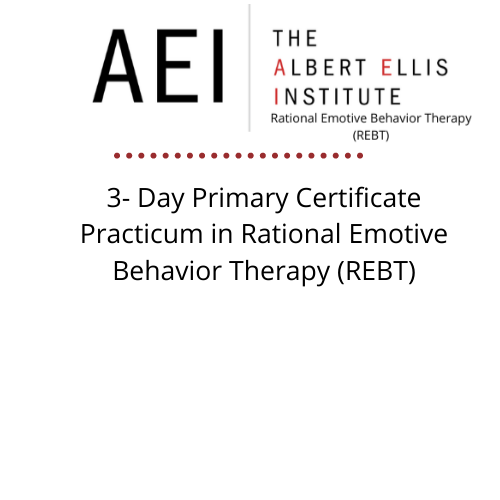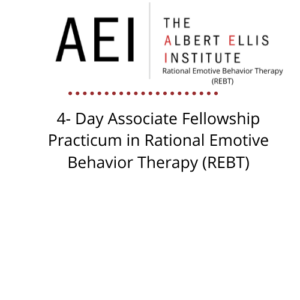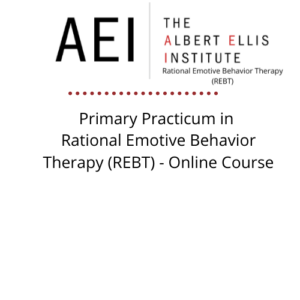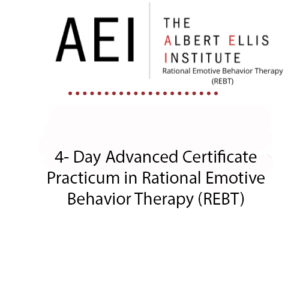Description
$1,049.00
Description
Dates: October 17th – 19th, 2025
Friday – 8:45 am EST – 7:15 pm EST
Saturday – 9:00 am EST- 7:15 pm EST
Sunday – 9:00 am EST – 4:30 pm EST
Location: HYBRID: Albert Ellis Institute, 145 East 32nd Street, 9th Floor, New York, NY 10016 & ZOOM (Subject to change)
Cost: $1049.00
Number of Didactic hours: 12; Number of Supervision hours: 12
24 Contact Hours/ 24 Continuing Education Credits will be provided by Albert Ellis Institute upon successful completion of the training.
Lecture 1: Introduction to Rational Emotive Behavior Therapy (REBT)- This is an introduction to Albert Ellis’ theory of emotional behavioral disturbance, including its origins and the ABC framework (Activating event-Beliefs-emotional and behavioral Consequences). Core irrational beliefs (demandingness, frustration intolerance, awfulizing, global rating of self, others, and the world) and the consequential unhealthy negative emotions (anxiety, anger, depression, guilt, shame, hurt) and maladaptive behaviors (procrastination, abuse of substances, verbally and physically lashing out at others, etc.) will be addressed. The distinction between healthy and unhealthy negative emotions, as well as rational versus irrational beliefs will be highlighted. The distinction between practical versus emotional problems and solutions; why REBT proposes addressing emotional problems before practical problems; and the prerequisite insights necessary before disputing client irrational beliefs will be addressed. Restructuring of irrational beliefs, the core of Rational Emotive Behavior Therapy, will be taught. A live demonstration with a participant will take place, showing in vivo the application of REBT to a real problem. The focus of this lecture is teaching participants that in the face of uncontrollable adversity, they have control over their thoughts, emotions, and behaviors.
Lecture 2: Clinical Interventions and Strategies– This lecture will cover the clinical implications of Ellis’ distinction between disturbed and nondisturbed emotions; how one goes about assessing irrational beliefs; There will be a focus on the B (belief) C (emotional and behavioral consequences) connection. This ultimately asks clients to assume responsibility for their thoughts, feelings, and behaviors, thereby giving them control to change them. The distinction between Beck’s challenging of the inferences, versus Ellis’ elegant solution of challenging the evaluations clients make from their inferences is highlighted. REBT’s active-directive hypothesis-driven approach to assessment will be taught. Strategies to identify clients’ irrational beliefs, including Inductive awareness, Inductive interpretation, and Inference Chaining will be taught. A focus on inference chaining will occur, as this is the heart of REBT’s approach to eliciting client irrational beliefs. Finally, challenging/disputing strategies will be taught to participants to replace client irrational beliefs with rational alternative beliefs. The use of various cognitive, emotive, and behavioral homework assignments will be emphasized.
Lecture 3: REBT’s Conceptualization of Emotions- This lecture discusses the binary model of distress as it relates to emotions. A review of the inference themes of the dysfunctional negative emotions (depression, anxiety, anger, shame, guilt, hurt) and the functional negative emotions (sadness, concern, annoyance, disappointment, regret) as well as the respected behavioral/action tendencies will be addressed.
Lecture 4: Mistakes to Avoid in REBT– Beginning therapists practicing REBT make a variety of errors, including not being active and directive, not setting an agenda, not recognizing when the target emotion has changed during a session, allowing clients to spend too much time talking about their past, etc. This lecture reviews the common errors therapists make as well as various strategies to correct them.
Peer Counseling 1: Practicing REBT in Peer Counseling– Participants will be assigned to small groups for practice incorporating the skills taught during the didactic portion of the training. An REBT certified supervisor will meet with the group, with participants practicing REBT with each other in dyads. Participants will be asked to bring up real problems (at their discretion) and each will have an opportunity to be a therapist and then a client. Participants will receive in vivo supervision of their demonstrated skills. There are four rounds of peer counseling during the training.
Peer Counseling 2: please see the above description.
Peer Counseling 3: please see the above description.
Peer Counseling 4: please see the above description.
Learning Objectives:
By the end of this workshop, participants will be able to:
- Explain the REBT theory of emotional and behavioral disturbance and change
- Describe REBT’s conceptualization of emotions from a binary distress perspective
- Identify and restructure clients’ maladaptive beliefs
- Demonstrate how to develop new adaptive beliefs, emotions, and behaviors
-
Describe at least ten (10) common mistakes new REBT therapists make
Eligibility
Open to psychologists, counselors, social workers, physicians, nurses, and graduate students. The minimum qualification for certificate candidacy is a master’s degree in psychology or counseling, M.S.W., M.D., or R.N. Other helping professionals (e.g., alcoholism counselors) may be eligible to participate in the full Practicum but will receive a Paraprofessional Certificate. Proof of degree or license must accompany the registration form.
Required Readings:
A Practitioner’s Guide to Rational-Emotive Behavior Therapy 3rd Edition by R. A. DiGiuseppe, K. A. Doyle, W. Dryden, & W. Backx
Dealing with Emotional Problems Using Rational Emotive Behaviour Therapy (REBT): A Practitioner’s Guide -2nd Edition by W. Dryden
Evaluation and Minimum Scores for Completion of the Primary Certificate in REBT:
- Successful completion of (75%) of an examination at the end of the training on the theory and practice of REBT.
- Skills rating of a minimum average of “3.5” across the four (4) live peer counseling sessions. If the participant does not meet this requirement, they can provide an additional demonstration(s) of peer counseling skills as necessary, to be reviewed by an approved faculty member at a cost to the participant.
Core Faculty Trainers:
Raymond DiGiuseppe, Ph.D., Sc.D., Director of Professional Education and Core Faculty Trainer, Albert Ellis Institute
Kristene A. Doyle, Ph.D., Sc.D., Director and Core Faculty Trainer, Albert Ellis Institute
Michael Hickey, Ph.D., Director of Psychological Evaluations and Core Faculty Trainer, Albert Ellis Institute
Windy Dryden, Ph.D., Sc.D., Core Faculty Trainer, Albert Ellis Institute
* Some instructors may receive royalties for the publication of any texts, books, articles, chapters, or psychological tests that are required, discussed and/or referred to in the presentations.
Instructor Credentials:
Raymond DiGiuseppe, Ph.D.: After earning a B.S. degree from Villanova University, Dr. DiGiuseppe received his Ph.D. from Hofstra University in 1975. He completed a postdoctoral fellowship at AEI in 1977. In 1980 he became the Institute’s Director of Professional Education, a position he has held since then. He is also a Core Faculty Trainer for Albert Ellis Institute. He has trained hundreds of therapists in Rational Emotive Behavior Therapy (REBT) throughout the world. He received the Jack Krasner Early Career Contribution Award from APA’s Division of Psychotherapy (29) and was elected a fellow of the American Psychological Association’s divisions of Psychotherapy, Clinical, School, and Family Psychology.
Dr. DiGiuseppe joined the faculty of St. John’s University in 1987 and is presently professor and chair of the psychology department. He has been very active in the Association for Behavioral and Cognitive Therapies (ABCT). Dr. DiGiuseppe helped develop the Diplomate in Behavioral Psychology (1986-87) and served on the Diplomate board. He was associate program chair (1995), and program chair (1996) for ABCT. He has served on the editorial board of ABCT’s Cognitive and Behavioral Practice. He served as ABCT convention coordinator (1997 – 2000) and associate convener for the 2001 World Congress for Behavior Therapy. Dr. DiGiuseppe developed and promoted popular convention formats such as the Master Clinician Series and the World Rounds demonstrations. Dr. DiGiuseppe was elected ABCT representative-at-large in 2001 and recently served as President of the organization.
Dr. DiGiuseppe has contributed to the scientific and clinical literature with six books, more than 120 chapters and articles, and hundreds of conference presentations. He is co-authored two psychological tests, The Anger Disorders Scale (for Adults, and the Anger Regulation and Expression Scale (for children and adolescents). He has co-authored several books on REBT including the Practitioner’s Guide to Rational Emotive Behavior Therapy, which is undergoing its third edition. His present scholarship focuses on clinical aspects of anger and REBT, on which he lectures widely.
Kristene A. Doyle, Ph.D.: Dr. Doyle is the Executive Director of Albert Ellis Institute (AEI). Dr. Doyle is also Director of Clinical Services, founding Director of the Eating Disorders Treatment and Research Center (EDTRC), and a licensed psychologist at AEI. She is also a Core Faculty Trainer for Albert Ellis Institute. During her 24-year tenure at AEI, Dr. Doyle has held various leadership roles including Associate Executive Director, Training and Development Coordinator, and Director of Child and Family Services. She is also a Diplomate in Rational-Emotive & Cognitive-Behavior Therapy (RE & CBT) and serves on the Diplomate Board.
In addition to training and supervising AEI’s fellows and staff therapists, Dr. Doyle conducts numerous workshops and professional trainings throughout the world. With a distinguished international presence, Dr. Doyle has influenced the growth and practice of RE & CBT in countries spanning several continents including North America, South America, Europe, Asia, and Africa.
Dr. Doyle’s clinical and research interests include Eating Disorders & Weight Management, RE & CBT treatment of children and adolescents, and Cognitive-Behavioral Therapeutic Process, Outcome & Dissemination. Dr. Doyle is co-author of A Practitioner’s Guide to Rational-Emotive Behavior Therapy, 3rd edition. She is also the co-editor of Cognitive Behavior Therapies: A Guidebook for Practitioners. She is co-editor of The Journal of Rational-Emotive & Cognitive-Behavior Therapy. She has contributed numerous book chapters on topics such as the treatment of eating disorders, ADHD, group therapy, and coping with loss. She has presented her research at several national and international conventions, including those of the American Psychological Association (APA), Association for Behavioral and Cognitive Therapies (ABCT), and the World Congress of Behavioral and Cognitive Therapies. In addition, Dr. Doyle has published in numerous scientific journals, some of which include Journal of Social Behavior and Personality and The Journal of Rational-Emotive & Cognitive-Behavior Therapy.
In addition to her work at AEI, Dr. Doyle is appointed as Full Adjunct Professor at St. John’s University in both the Clinical Psychology and School Psychology Doctoral Programs, where she has taught for 24 years. She is also a Full Adjunct Professor serving as a supervising psychologist at Teachers College, Columbia University, New York, NY.
Dr. Doyle served on the Board of Directors for The Institute of General Semantics, served on The Advisory Council for Rescuing Leftover Cuisine (RLF), and is a member of the New York City Department of Health & Mental Hygiene Medical Reserves Corps.
Dr. Doyle has served as an expert commentator during multiple media appearances spanning ABC’s 20/20, Access Hollywood, Channel 2, and Channel 11 News. Dr. Doyle has also been quoted in prestigious publications including The New York Times, U.S. News and World Report, and The Wall Street Journal.
Michael Hickey, Ph.D.: Dr. Hickey is a licensed psychologist and the founding Director of the Center for Psychological Evaluation and the Center for Treatment and Research of Obsessive-Compulsive & Related Disorders at Albert Ellis Institute (AEI). A graduate of Western New England University, Dr. Hickey earned his B.A. in Psychology, Summa Cum Laude, and received the University’s prestigious Alumni Award for graduating with the highest cumulative grade point average. He went on to earn his M.A. and Ph.D. in Combined Clinical and School Psychology at Hofstra University and completed a pre-doctoral internship and fellowship at AEI.
In addition, Dr. Hickey is a core faculty trainer for AEI and has trained numerous students and mental health professionals in the method and application of Rational Emotive Behavior Therapy (REBT). He has conducted several public lectures and professional workshops on a variety of topics including evidence-based treatment for Anxiety Disorders, Body Dysmorphic Disorder (BDD), and Obsessive-Compulsive Disorder (OCD).
Dr. Hickey’s doctoral dissertation examined the role of disgust sensitivity as an understudied emotional component in BDD and was one of the first to publish an empirical investigation on this topic. Additional clinical and research interests include the etiology and treatment of anxiety disorders, BDD, and other Obsessive-Compulsive Related Disorders. Dr. Hickey has published his work in peer-reviewed journals including the International Journal of Cognitive Therapy and the American Journal of Psychotherapy. He has authored and co-authored several book chapters on topics such as REBT, anxiety disorders in children and adults, couples therapy, and clinical supervision. He is also on the editorial review board for the Journal of Rational-Emotive and Cognitive-Behavior Therapy.
Dr. Hickey has held memberships in the American Psychological Association (APA), the Association for Behavioral and Cognitive Therapies (ABCT), the International Obsessive-Compulsive Disorder Foundation (IOCDF), and the New York State Psychological Association. He has presented his research at annual conventions for APA, ABCT, and IOCDF. In the media, Dr. Hickey has provided expert advice on overcoming social anxiety on New York City’s PIX 11 Morning News. In addition to his work at AEI, Dr. Hickey has over 10 years of experience in conducting intellectual evaluations of children for the Educational Records Bureau (ERB) and has held adjunct faculty positions at Molloy University, Post University, Hofstra University, St. John’s University and is currently an Adjunct Assistant Professor in the School Psychology Graduate Program at Teachers College, Columbia University.
Windy Dryden, Ph.D.: Dr. Dryden is a Core Faculty Trainer at Albert Ellis Institute. Dr. Dryden is Emeritus Professor of Psychotherapeutic Studies, Goldsmiths, University of London. He is a Fellow of the British Psychological Society (BPS) and of the British Association for Counselling and Psychotherapy (BACP). He began his training in REBT in 1977 and became the first Briton to be accredited as an REBT therapist by the Albert Ellis Institute. In 1981, Windy spent a six-month sabbatical at the Center for Cognitive Therapy, University of Pennsylvania, one of the first British psychologists to do an extended training in Cognitive Therapy. He is a Fellow of Albert Ellis Institute and a Founding Fellow of the Academy of Cognitive Therapy.
While his primary therapeutic orientation is REBT, Professor Dryden has been very much influenced by his cognitive therapy colleagues, by the working alliance theory of Ed Bordin, and the work by Cooper and McCleod on pluralism in counseling and psychotherapy.
Professor Dryden is perhaps best known for his voluminous writings in REBT/CBT and the wider field of counseling and psychotherapy. To date he has authored or edited over 250 books, making him probably the most prolific book writer and editor currently alive in the field today. He has also edited over 20 book series including the best-selling “CBT: Distinctive Features” series.
Professor Dryden was the founding editor of the British Journal of Cognitive Psychotherapy in 1982 which later merged with the Cognitive Behaviorist to become the Journal of Cognitive Psychotherapy: An International Quarterly. Windy was co-founding editor of this journal with E. Thomas Dowd. From 2003 until 2012, Windy served as editor of the Journal of Rational-Emotive and Cognitive-Behavior Therapy.
Professor Dryden’s current interests are in providing very brief therapy and coaching for people who need help quickly and briefly. In particular, he advocates the use of Single-Session Therapy as a way of providing help at the point of need.
Cancelling of Registration
| Time Frame (Days before Training) | Cancellation Fees | |
| 28 days or more | None | |
| 14 to 27 days | 50% of registration fee | |
| Less than 14 days | 100% of registration fee |
Albert Ellis Institute incurs significant administrative costs related to your registration before a training. Therefore, the following fees apply should you cancel your registration. If you wish to cancel your registration, a notification should be sent in writing to info@albertellis.org. Refunds will be provided as noted above with associated relevant fees.
Any necessary information related to inclement weather that will affect a training will be emailed to the address you have provided us or is available by calling 212-535-0822 during usual business hours.
There are times when Albert Ellis Institute may need to cancel a training. We would only do so with good reason, however, we reserve this right, as well as the right to reschedule trainings and/or substitute presenters. If we need to cancel or reschedule a training, we will transfer your registration to the next available scheduled training on that particular topic. If you cannot or choose not to transfer your registration, you may request a full refund of training fees paid.
Albert Ellis Institute disclaims any liability for any losses or damages, direct or indirect, arising from a training cancellation and will not be held responsible for any associated costs incurred with respect to travel, accommodation, US visa application fees, or related fees.


Albert Ellis Institute is approved by the American Psychological Association to sponsor continuing education for psychologists. Albert Ellis Institute maintains responsibility for this program and its content.
Albert Ellis Institute has been approved by NBCC as an Approved Continuing Education Provider, ACEP No. 5145. Programs that do not qualify for NBCC credit are clearly identified. Albert Ellis Institute is solely responsible for all aspects of the programs.
Albert Ellis Institute is recognized by the New York State Education Department’s State Board for Psychology as an approved provider of continuing education for licensed psychologists #PSY-0133.
Albert Ellis Institute is recognized by the New York State Education Department’s State Board for Social Work as an approved provider of continuing education for licensed social workers #SW-0131.
Albert Ellis Institute is recognized by the New York State Education Department’s State Board for Mental Health Practitioners as an approved provider of continuing education for licensed mental health counselors #MHC-0019.




